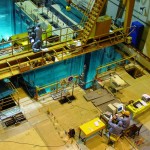Archives
Nautilus Peace and Security Weekly – 28 March 2014
- DETERRENCE: The Folly of Nuclear Armament
Deep Borehole Disposal of Spent Fuel: International Developments and Implications for NE Asia

by Neil A. Chapman 25 March 2014 This Special Report was originally published as a Working Paper 2013-12 by the Center for Energy, Governance and Security at Hanyang University, Seoul. I. INTRODUCTION Deep borehole disposal (DBD) has been discussed as a possible means of disposing of spent fuel (SF) from nuclear power reactors in some East Asian countries, to support […]
Nautilus Peace and Security Weekly – 20 March 2014
- DETERRENCE: The Future of the U.S. Intercontinental Ballistic Missile Force
- DPRK: Military and Security Developments Involving the Democratic People’s Republic of Korea Talks
- ENERGY SECURITY: Revealed: How Climate Change Ended World’s First Great Civilizations
- GOVERNANCE AND CIVIL SOCIETY: South Korea-U.S.-Japan Summit Highly Likely: Sources
- CLIMATE CHANGE ADAPTATION: The Future of the Winter Olympics in a Warmer World
- AUSTRAL PEACE AND SECURITY: Maneuvers Make Waves but in Truth Chinese Navy is a Paper Tiger
Nautilus Peace and Security Weekly – 13 March 2014
- DETERRENCE: Should Ukraine Have Gotten Rid of Its Cold War Nukes?
- DPRK: North-South Reunion of Separated Families, Relatives Held
- ENERGY SECURITY: Climate Change: Evidence & Causes
- GOVERNANCE AND CIVIL SOCIETY: Fukushima Anniversary: Japan Remembers
- CLIMATE CHANGE ADAPTATION: Fourth Annual Survey of Australian Attitudes to Climate Change: Interim Report
- CLIMATE CHANGE AND SECURITY: Billions Needed to Fund Deforestation Prevention Plan: Report
Nautilus Peace and Security Weekly – 6 March 2014
- DETERRENCE: Nuclear Triad to Survive Hagel Cuts in Pentagon Spending
- ENERGY SECURITY: Shifting Energy Trends Blunt Russia’s Natural-Gas Weapon
- GOVERNANCE AND CIVIL SOCIETY: Opposition Bloc to Create United Coalition Party
- CLIMATE CHANGE ADAPTATION: Conflict, Climate change and Politics: Why a Techno-centric Approach Fails the Resilience Challenge
- CLIMATE CHANGE AND SECURITY: Power Sharing and Risk Management in Hugh White’s ‘China Choice’
Shale Gas Revolution and Desperate “Eastward” Energy Policy of Russia

North America’s shale gas revolution has fundamentally changed North America’ s energy market, thereby bringing new opportunities and challenges to the Northeast Asian LNG market.
For North America, due to the increase in shale gas production, the export-import structure of gas in the US has been reversed, and the possibility of energy independence has increased. In the meantime, Canada, being almost fully dependent on the US for gas export, can not help but explore new markets, which is in fact the Asian market.
For major Northeast Asian gas importers, such as Japan and Korea, which are heavily dependent upon the Middle East and East Asia, Russia’s East Siberia is considered a new alternative for the purpose of diversifying LNG import sources for the past decade. Therefore, Northeast Asian countries tried their best to secure East Siberian gas through enhancing their bilateral relationships with Russia. However, due to the recent shale gas revolution in North America, the Northeast Asian region now encounters new opportunities in LNG contracts, which is totally different from the situation in the past.
In the mean time, once the negotiation on gas prices between Russia and China is settled, 38bcm of Russian gas will be introduced to China, In this regard, Korea and Japan should pay attention to the possible revamp in the Northeast Asian energy market and the impact related to securing energy supplying sources.
Under these circumstances, the introduction of American shale gas with a cheap price and favorable conditions Ci.e., Henry Hub price, without the clauses of take or pay and destination, etc.), or Canadian gas with relative advantages in terms of transportation distance and gas reserves, is predicted to exert a significant impact on the Northeast Asian LNG market.
Given that Northeast Asia has been significantly dependent on the Middle East or neighbouring East Asia in terms of energy security, if the region become the beneficiaries of North America ‘s shale gas revolution, the most notable thing would be that America and Canada, which have been alliances in political and military contexts, will become alliances of Korea and Japan in energy security as well. It can be referred to as a grand paradigm shift.
Apart from North America, Australia and East Africa have huge potential in gas production, which can enhance the buyers’ power in the Northeast Asian LNG market.
For Korea, the implication of East Siberian gas is not simply limited to the area of energy security, since the PNG project (gas pipeline linking Russia and South Korea via North Korea) based in East Siberian gas fields are considered as important methods to secure peace and prosperity on the Korean peninsula and in Northeast Asia. However, this project is thought to have missed a good time to be commenced, and Russian gas is losing its price competitiveness s compared to North America and Australia.
In conclusion, it is necessary to establish new rules and policies in the Northeast Asian energy market and within the regional situation as a whole. Initiatives on the LNG trading hub in the Asian region should be pushed forward through closer regional cooperation. In particular, Korea, Japan, and China, as major consumers, have to share common interests and make the maximum use of the favorable conditions of the shale gas revolution. Furthermore, the scope of cooperation should not be limited to Northeast Asia, which includes Korea, Japan, China, etc., but be expanded to the Asia Pacific region including North America.
Nautilus Peace & Security Weekly – 27 February 2014
- DETERRENCE: Navy in 2014: Undersea Drones, Arctic, Marines on New Ships, Chief of Naval Operations Discusses his To-Do List
- DPRK: Report of the Commission of Inquiry on Human Rights in the Republic of Korea
- ENERGY SECURITY: Climate Change is Here Now and it Could Lead to Global Conflict
- GOVERNANCE AND CIVIL SOCIETY: Umbrella Union Holds Protest Rally in Downtown Seoul
- CLIMATE CHANGE ADAPTATION: Moving Stories: the Voices of People who Move in the Context of Environmental Change
- CLIMATE CHANGE AND SECURITY: High Seas Need International Police Force, says Former UK Foreign Secretary
LNG Import Diversification in Asia

Asia’s share of global demand for natural gas has increased from 13 to 18 per cent over the past decade, and t…
Nautilus Peace and Security Weekly – 20 February 2014
- DETERRENCE: China’s Deceptively Weak (and Dangerous) Military
- DPRK: Report of the Commission of Inquiry on Human Rights in the Republic of Korea
- ENERGY SECURITY: Science Linking Drought to Global Warming Remains Matter of Dispute
- GOVERNANCE AND CIVIL SOCIETY: 21 Envoys Form Peninsula Club
- CLIMATE CHANGE ADAPTATION: A Qualitative Examination of the Health Workforce Needs during Climate Change Disaster Response in Pacific Island Countries
- AUSTRAL PEACE AND SECURITY: Jakarta Sees Chilly Ties with Australia until October
- DETERRENCE: The Future of the U.S. Intercontinental Ballistic Missile Force

